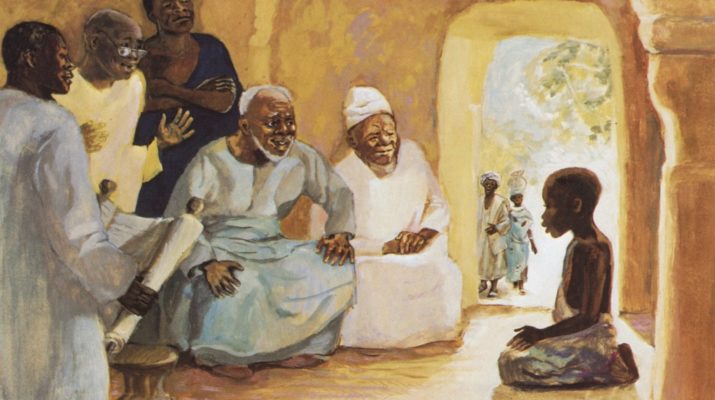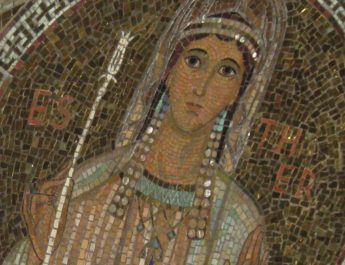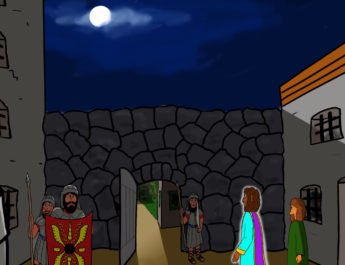Luke 2:41-51
A Women’s Lectionary 7
41 Now every year his parentsA wentB to JerusalemC for the festivalD of the Passover.E
A “parents” = goneus. From ginomai (to come into being, to happen, become, be born; to emerge from one state or condition to another; this is coming into being with the sense of movement or growth). This is a parent or a father.
B “went” = poreuomai. From poros (ford, passageway). This is to go, travel, journey, or die. It refers to transporting things from one place to another and focuses on the personal significance of the destination.
C “Jerusalem” = Ierousalem. From Hebrew yerushalaim (probably foundation of peace); {from yarah (to throw, shoot, be stunned; to flow as water so figuratively to instruct or teach) + shalem (to make amends, to be complete or sound)}. This is Jerusalem, dwelling of peace.
D “festival” = heorte. This is a holiday or feast.
E “Passover” = pascha. From Aramaic corresponding to Hebrew pesach (Passover or the offering for Passover); from pasach (to stop, pass over, skit over, to spare). This is Passover – used for the feast, the lamb of sacrifice, the day, and the festival itself. This is where the term “paschal” comes from as in the “paschal lamb.”
42 And when he wasF twelve years old, they went upG as usualH for the festival.
F “was” = ginomai. Related to “parents” in v41. See note A above.
G “went up” = anabaino. From ana (up, back, among, again, anew) + the same as basis (step, hence foot; a pace); {from baino (to walk, to go)}. This is to come up in a literal or figurative sense – ascent, rise, climb, enter.
H “as usual” = kata + ho + ethos. Literally “according to the custom.” Ethos is 12x in NT. From etho (custom, what is customary). This is custom habit, rite – also, doing something that the law requires. It can be an unwritten custom, acting in accordance with tradition.
43 When the festivalI was endedJ and they started to return, the boyK JesusL stayed behindM in Jerusalem, but his parents did not knowN it.
I “festival” = hemera. Literally “day.”
J “was ended” = teleioo. From teleios (going through the steps to complete a stage or phase and then moving on to the next one; reaching an end and so being complete or “perfect”; also full grown or mature); from telos (an end, aim, purpose, completion, end goal, consummation, tax). This is finish, accomplish, bring to an end, complete, reach a goal, finish a race, to consummate. It refers to completing stages or phases to get to an ultimate conclusion. It can also mean consecrate or fulfill.
K “boy” = pais. Perhaps from paio (to strike or sting). This is child, youth, servant, or slave.
L “Jesus” = Iesous. From Hebrew Yehoshua (Joshua, the Lord is salvation); {from YHVH (proper name of the God of Israel; the self-existent and eternal one); {from havah (to become) or from hayah (to come to pass, become, be)} + yasha (to deliver, defend, help, preserve, rescue; properly, to be open, wide or free, which implies being safe. So, in a causative sense, this is to free someone)}. This is Jesus or Joshua in Greek – the Lord saves or the Lord is salvation.
M “stayed behind” = hupomeno. 17x in NT. From hupo (by, under, about, subordinate to) + meno (to stay, remain, wait, await, continue, abide). This is properly to remain behind or remain under. It implies endurance, patience, steadfastness, enduring trials, and waiting in hope.
N “know” = ginosko. This is to know, recognize, realize, perceive, learn. It is knowledge gained through personal experience.
44 AssumingO that he was in the group of travelers,P they went a day’s journey.Q
O “assuming” = nomizo. 15x in NT. From nomos (what is assigned – usage, law, custom, principle; used for the law in general or of God’s law; sometimes used to refer to the first five books of the Bible or the entire Old Testament; also used to refer to theology or the practice and tradition of interpreting and implementing the law of God); from nemo (to parcel out, assign). This is to practice, think, consider, suppose, hold by custom. This is thinking that something applies given precedent and practice – to do by law.
P “group of travelers” = sunodia. 1x in NT. From sun (with, together with) + hodos (way, road, path, journey). This is caravan, a company travelling together. It is where the word “synod” comes from.
Q “journey” = hodos. Related to “group of travelers” in v44. See note P above.
Then they started to lookR for him among their relativesS and friends.T 45 When they did not findU him, they returned to Jerusalem to searchV for him.
R “started to look” = anazeteo. 3x in NT. From ana (up, again, back, among, anew) + zeteo (to seek, search for, desire. searching for something by inquiring or investigation; to seek in a literal or figurative sense; to worship God). This is to look for thoroughly – a difficult searching. It is a full inquiry or investigation that is conducted with persistence.
S “relatives” = suggenes. Related to “parents” in v41 & “was” in v42. 12x in NT. From sun (with, together with) + genos (family, offspring, kin – in a literal or figurative sense); from ginomai (see note A above)}. This is relative, kinsman, offspring, or otherwise someone from the same stock. It can also be used for a fellow countryman.
T “friends” = gnostos. Related to “know” in v43. 15x in NT. From ginosko (see note N above). This is someone who is known – like an acquaintance or friend.
U “find” = heurisko. This is to find, learn, or obtain. It is to discover something, which generally implies a period of searching for it. This is to find in a literal or figurative sense. This is where the word “heuristic” comes from.
V “search” = anazeteo. Same as “started to look” in v44. See note R above.
46 WAfter three days they found him in the temple,X sitting among the teachers,Y listeningZ to them and asking them questions.AA 47 And all who heard him were amazedBB at his understandingCC and his answers.
W {untranslated} = ginomai. Literally “and it was…” Same as “was” in v42. See note A above.
X “temple” = hieron. From hieros (sacred, something sacred, temple, holy, set apart; something consecrated to a god). This is the word for temple.
Y “teachers” = didaskalos. From didasko (to teach, direct, instruct, or impart knowledge; in the New Testament, almost always used for teaching scripture); from dao (to learn). This is teacher or master.
Z “listening” = akouo. This is hear or listen, but it also means to understand by hearing. This is where the word “acoustics” comes from.
AA “asking…questions” = eperotao. From epi (on, upon, against, what is fitting) + erotao (asking a question or making an earnest request; used when one anticipates special consideration for their request); {from eromai (to ask) OR from ereo (to say, tell, call, speak of)}. This is to question, interrogate, seek, or demand. The questioner is at an advantage – in a preferred position when they make their question.
BB “amazed” = existemi. 17x in NT. From ek (from, from out of) + histemi (to stand, place, establish, appoint, stand ready, be steadfast). This is to displace or take something or someone from standing. Figuratively, it is to be overwhelmed an flabbergasted – as if beside oneself. By extension, it is astonished, amazed, or mad.
CC “understanding” = sunesis. 7x in NT. From suneimi (to put together – used figuratively to mean understand, consider, gain insight; this is bringing together facts or notions and synthesizing them into a whole; making a summary to arrive at a final conclusion that includes how to apply the insight to life; it can also imply acting piously or being wise); from sun (with, together with) + hiemi (to send, put). This is understanding, cleverness, intelligence, knowledge, or insight. Just as the root verb, it is synthesized reasoning that brings facts together to understand indirect truths from the facts at hand.
48 When his parents sawDD him they were astonished;EE and his mother said to him, “Child,FF why have you treatedGG us like this?
DD “saw” = horao. To see, perceive, attend to, look upon, experience. Properly, to stare at and so implying clear discernment. This, by extension, would indicate attending to what was seen and learned. This is to see, often with a metaphorical sense. Can include inward spiritual seeing.
EE “astonished” = ekplesso. 13x in NT. From ek (out, out of) + plesso (to pound, strike, flatten; figuratively, cause a calamity). This is to strike with panic, astonish shock. It is a moment that shakes someone from their senses and leaves them dumbfounded or at a loss.
FF “child” = teknon. From tikto (to beget, bring forth, produce). This is a child, descendant, or inhabitant.
GG “treated” = poieo. This is to make, do, act, construct, abide, or cause.
Look,HH your father and I have been searchingII for you in great anxiety.”JJ
HH “look” = idou. From eido (to be aware, see, know, remember, appreciate). This is see! Lo! Behold! Look! Used to express surprise and or draw attention to the statement.
II “searching” = zeteo. Related to “started to look” in v44. See note R above.
JJ “in great anxiety” = odunao. 4x in NT – 1x of Jesus’s parents when they lose him at the Temple (Luke 2:48), 2x of the Rich Man’s agony in the Parable of the Rich Man and Lazarus (Luke 16:24-25), and 1x when Paul feels grief on saying goodbye to the Ephesian elders (Acts 20:38). From odunao (pain, grief, sorrow, whether physical or mental); from duno (to enter, sink into; can also be set like the sun); from duo (to sink). This is to cause or experience great pain, whether of mind or body. It is personal anguish that is shown through grieving.
49 He said to them, “Why were you searching for me? Did you not knowKK that I mustLL be in my Father’s house?”MM 50 But they did not understandNN whatOO he said to them.
KK “know” = eido. Related to “look” in v48. See note HH above.
LL “must” = dei. From deo (to tie, bind, compel; declare unlawful). This is what is necessary or proper. It is what is needed or what one should do – a duty or something inevitable. This refers to something absolutely necessary.
MM The word “house” does not appear as such. Literally, it is “in the of the father my.”
NN “understand” = suniemi. Related to “understanding” in v47. From sun (with, together with) + hiemi (see note CC above). This is to put together – used figuratively to mean understand, consider, gain insight. It is bringing together facts or notions and synthesizing them into a whole. It is making a summary to arrive at a final conclusion that includes how to apply the insight to life. It can also imply acting piously or being wise.
OO “what” = ho + rhema + hos. Literally “the word that.” Rhema is from rheo (to speak, command, make, say, speak of); from ereo (to all, say, speak of, tell; denotes ongoing speech). This is word, which implies a matter or thing spoken, a command, report, promise, thing, or business. Often used for narration, commands, or disputes.
51 Then he went downPP with them and came to Nazareth,QQ and was obedientRR to them. His mother treasuredSS all these thingsTT in her heart.UU
PP “went down” = katabaino. Related to “went up” in v42. From kata (down, against, throughout, among) + baino (see note G above). This is to go down in a literal or figurative sense – whether down from the sky or from higher to lower ground.
QQ “Nazareth” = Nazareth. 12x in NT. Perhaps from netser (branch) OR from natsar (to watch, guard, protect). This is Nazareth, meaning perhaps branch or protected. It is a city in Galilee. See https://en.wikipedia.org/wiki/Nazareth
RR “obedient” = hupotasso. From hupo (by, under, about, under one’s authority) + tasso (to arrange, appoint, determine). This is to place under. So it is to subject, submit, obey, or subordinate.
SS “treasured” = diatereo. 2x in NT. From dia (through, across to the other side, thoroughly) + tereo (to guard, observe, keep, maintain, or preserve; figuratively, spiritual watchfulness; guarding something from being lost or harmed; fulfilling commands, keeping in custody, or maintaining; figuratively can mean to remain unmarried.); {teros (a guard or a watch that guards keep); perhaps related to theoreo (gazing, beholding, experiencing, discerning; looking at something to analyze it and concentrate on what it means; the root of the word “theatre” in that people concentrate on the action of the play to understand its meaning); from theaomai (to behold, look upon, see, contemplate, visit); from thaomai (to gaze at a spectacle; to look at or contemplate as a spectator; to interpret something in efforts to grasp its significance); from theoros (a spectator or envoy)} This is to hold fast, treasure, keep something with care to make sure it is safe – thoroughly watched or observed. It can also mean totally avoid.
TT “things” = rhema. Same as “what” in v50. See note OO above.
UU “heart” = kardia. Literally the heart, but figuratively mind, character, inner self, will, intention, thoughts, feelings. Also, the center of something. The word heart is only used figuratively in the Old and New Testaments. This is where “cardiac” comes from.
Image credit: “Jesus among the Teachers” by Jesus MAFA in Cameroon, 1973.




